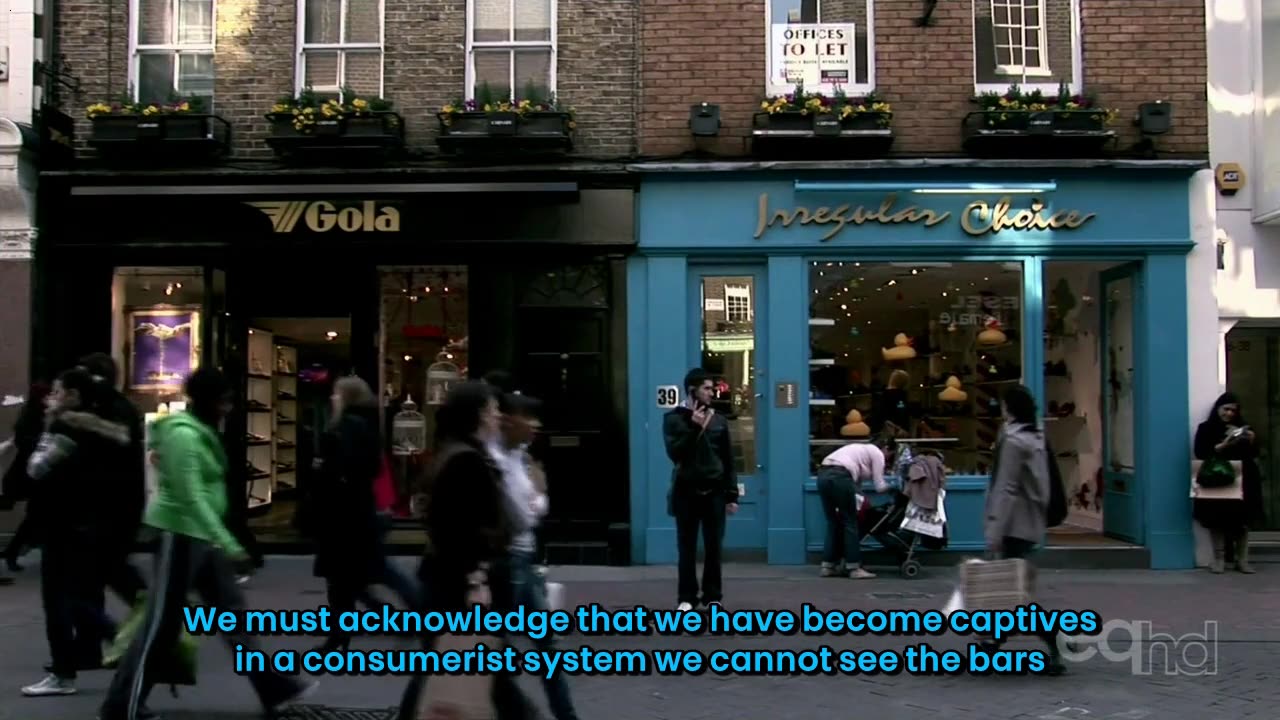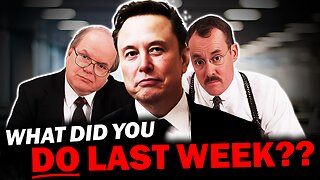Premium Only Content

Consumed - Inside the Belly of the Beast (2011)
perhaps the most incredible story of the last million years is the rise of modern human culture the cities we populate and the lives that we leave it is the world that our children will inherit but after a century of exponential growth in population and consumerism people are questioning the nature of modern life beginning to doubt our motivations and predicting environmental destruction this film uses evolutionary psychology as a tool to look at modern society in understanding human nature our current concerns look smaller more difficult to understand we've all got this weird mental illness called consumerism we've all kind of gone collectively psychotic chasing status in public with people who don't really care and neglecting your own lovers and friends and neighbors and kids you know that this consumption of material items is a means to acquire status is as much of a trap as it is a set of freedoms just pervasive nature of it is perhaps crossed the threshold of us being able to cope with it and process information the high street is actually a stressful anxious place we're getting very little from it but working incredibly hard to try and figure it all out we have the delusion that we really have deep insight into ourselves already we're very sophisticated now in the early 21st century but we're going to seem incredibly naive in another hundred years our grandchildren will think what were they on about why did they care about brands and having six bedroom houses if they're only one married couple and one kid why did they care about that music music music there's a lot of baggage and meaning attached to the word consumer and consumerism but for all the negative connotations consumerism and consumptive processes are merely descriptive words for something that feels very normal for the human animal to do they're the result of a very natural human urge to experience and to grow and to learn and to play out dreams and ambitions and aspirations and in that respect consumption can be seen as something incredibly natural and incredibly normal for a stimulus hungry species such as ours to do and as we now know what clouds are we know what thunder is we know why plants grow as things become increasingly understood the need for mystery and experience and magic is still there but we need to kind of synthesize and make ways of experiencing that music music music I just wish I had a decent kitchen music music music music music music music music music music music of products and experiences has now also become a significant measure for our lives there is this story that we're all very aware of but no one ever sat us down and told us the story but we kind of understand through media in many ways we understand that landscape and where the milestones are and for example your first double bed buying your first cot I don't think it's necessarily production and consumption that's driving that it's it's just that this is a human process and it's a human way of structuring and creating sense out of the future which is totally unknown the difference is that we've chosen to structure it and signpost it with products and possessions this is my daughter Jessie passing one of her milestones riding a bike without stabilizers come in come on this is Alex my son taking his first steps they are hungry for experience and living in a highly developed society the means to feed this home is unlimited the planet has been turned into a playground for us all our lives have never been richer yet our need for more seems undiminished growth has become fetishized but more money more holidays more work more choice more stuff in more houses it's pushing us to the limit I think if you took a prehistoric human he transferred them into the modern world they would be really surprised that we aren't happier than we are they would think you're living in a golden age and you're sort of squandering it on all these silly anxieties as there are only two possible messages by and sell that even if it did read self the information would still be clear if you know addictions depression and mental health issues are becoming part of everyday conversation we are losing ourselves in the rush struggling to keep our head above water the idea that we're sense hungry or stimulus searches I think we've made ourselves that way by developing a contemporary experiential landscape where the majority of problems are already solved there's actually nothing for us to do stop our goal on or off one or none go or no go there's not just the individual financial and psychological cost of modern culture there is also an environmental cost and in a rigorous study behavioral scientist Warren Hearn found the human race is acting like a cancer on the planet displaying all the four major characteristics of a malignant process ultimately cancer kills the organism that supports it I think it's become increasingly clear that the kind of growth rates that we're getting around the world 10 plus in countries like China and India a norm of two or three percent in most industrialized can't be sustained the sheer throughput of materials uh energy resources that are finite most of them that cannot continue into the long term the philosopher John Gray concludes the human population can only be maintained by desolating the Earth creating an era of solitude in which little remains of the planet but us and the prosthetic environment that keeps us alive in Britain which household is consuming as if there were three planets rather than one you can see that this very natural human process is beginning to mutate into something uh perhaps uh toxic and negative seat torn pants thieves are sitting down said Dudley drink milk modern society is the story of our age for good or evil scientists philosophers and psychologists have been looking at the evolution of the human speech issues in an attempt to understand a meteoric rise and our recent detachment from the environment I think the only I think that's the only way we are different from our recent detachment from the animals is in the type of consciousness that we have got. Consider that we have only been walking around in this earth as Homo sapiens for 200,000 years which is nothing in geological term. Reminds us that we're just babies on the planet and so we're on a very steep learning curve. Evolutionary theory says we have built in our genes to prime subconscious motivators, survival and attracting a mate. The principal tool humans use to fulfill both of these needs is the brain. Our brain has tripled in size since we evolved from primates. It is what makes us unique as animals and research suggests if we understand the mechanisms of the brain we begin to understand our whole culture, consumerist or otherwise. Most animals run around worrying about three things, food, predators and grooming themselves to get rid of parasites and infectious disease. Once we've taken care of that, once we have agriculture to produce food, once we've shot and killed all the predators around us, and once we've got sanitation and medicine to take care of infectious disease largely, we can turn our minds towards those other obsessions, social status and sexual attractiveness. So lot more time thinking about that and obsessing about those issues social and sexual issues then probably any other animals I've had the luxury of doing before in the history of life on earth most of our ornaments are mental and behavioral and that's mostly what we're showing off in courtship we don't really flash huge tails like peacocks we don't use that much sexual coercion compared to other species so we're relatively peaceful we're relatively naked and we do most of our courtship through language and showing off our brain capacities like our intelligence personality moral virtues burning the calories in your brain to produce a good sense of humor or to sing well or to produce interesting art or to show off your creativity in any of the natural human ways that we've evolved to do in modern consumerist culture all of that effort all of that status seeking effort all of the mating effort is now channeled into the economy it's channeled into the goods and services that we buy so the principal way you're supposed to display your mental traits now is through your purchases the economy tries to capture all of our mating effort into these these goods and services and turn them into our props for mating products have therefore become a means of promoting ourselves beyond the talking we use them as a signal the foundation's for this behavior will aid down hundreds of thousands of years ago as we evolved a cultural trait called prestige the big difference between humans and other animals in terms of rankings and my partner breastfeeding you know with 줄ова centella'is aiert, strong honeybee, Jay Darkin considers this nutrition point of life and the number one important achievement and trudging to get into a Russell old lady. rankings and social status is that they continue this business as part of their duties that they follow. don't have what I'm going to define as prestige. They have social status rankings, some are higher status than others, but all of that status, the relative positioning of one to another is determined by dominance behaviors. So violence, threat of violence, coercion. Only humans have what I'm going to call prestige, and that is respect or authority or social power that is freely granted from one individual to another. The desire for prestige is Darwinistic in the sense that it probably has been selected for during the course of human evolution. Certainly since it's something we don't share with other primate species that desire for prestige, and then perhaps the signaling component as well, has something that's emerged over the course of human history. And I would say that it's done so because it's adaptive. As you say it confers a benefit. getting increased goods, services, respect, authority from others has got to have benefits, therefore natural selection over time has shaped our psychologies and our behaviours in such a way that we both desire prestige and act in ways to try and acquire it. There is one more important factor to consider. Because the brain's capacity has evolved to be the most crucial component in the survival and development of the human species, it has an in-built predisposition for growth. We are naturally driven to stimulate it. It is why we feel boredom so acutely, why we are so mentally restless. Our huge brain capacity is what makes us unique among animals and in its simplest form, consumption is nourishment. And so brain food is part of our daily diet. Led by the... ...assistant, the family procession forms to enter the vestibule of the church where the rector and crucifer await the episcopal service. It is fair to say our survival instinct and need for personal growth and prestige has been up until recent times the principal driver for society to evolve. Harnessing the brain's ingenuity, it has led from the agricultural revolution to the industrial revolution. From wind and water power, to fossil fuel and nuclear power. From economic activity that started local and is now global. The natural need to secure a future for ourselves, our children and our species has accelerated at a startling pace. With huge success. We're the only species that changes where we live to suit us. And when we have a good idea, it spreads. Transigram, where the fun comes from, it's a swing-wing. It's a what? If we now look at modern society, we can see how capitalism not only reflects our evolutionary tendencies, but also amplifies and distorts it. Marketing is like the air we breathe. It's all around us. Marketing gurus have learned how to push our evolutionary buttons. They know status is a psychological pressure point. As is our need to promote our intelligence, creativity and emotional stability. It means that by 20, the average westerner has seen 1 million commercial messages. And budgets for advertising for kids has risen to over 1 billion dollars. We are now indoctrinated to consume from birth. Dreamworks, monsters, vice versa. Get your heads off and suck their guts out. Modern sales techniques were born at the frontier. They were born at the end of the 20th century. Sigmund Freud's nephew, Edward Bonnet, was living in America. And after success working as an agent, he was put in charge of propaganda as America entered the Great War in 1916. He was so successful that when peace came, he believed that if people's opinions could be molded at time of war, then why not while at peace? He coined the phrase public relations and set about getting people to buy stuff. Fundamental in his approach was the use of aspirational marketing. At the request of corporations, worried that people would stop buying once they had everything for a comfortable life, Bonnet set about making consumerism the way we show both our success and our personality. The corporations, especially in the mid-to-mid 20th century, 20th century were actively looking at the way they could trigger off psychological impulses deep within us that would cause us to desire new products that we had never ever thought of desiring before. So in that respect, it's pushed upon us. But it's only possible to do that because, as Microsoft would put it, there are security vulnerabilities within us. The 1950s saw consumerism come of age, a golden era where scientists, inventors, designers, and corporations competed to meet the desires of the ever-hungry people. Marketing culture was everywhere, and with the dominance of Hollywood films and the invention of television, it wasn't long before the rest of the world got to witness how comfortable the other half lived. See it? Isn't it beautiful? If you had a car like that, I'd really be popular. Everybody would want to be friends with me then. One critical thing that advertising does is it tries to convince consumers that above average products can compensate for below average traits. Shirt right, tie right, and coat right. You can't be popular unless you know how to dress. So that if you're not that funny, you're not that verbally creative, you're not artistic, you don't have any of that. But if you're not that funny, you're not that creative, you don't have any of that romantic skills that are naturally attractive, you can compensate, don't worry. You can get the engineering degree, make a respectable living, buy a bunch of stuff, and still be viable and attractive on the mating market. I think that's a delusion. It doesn't actually work. You might attract a spouse for a while, but they'll get bored with you, and they'll leave you, and they'll divorce you, and they'll go looking for somebody else who's more interesting. So, what's happening is, you're going to have to find someone who's more interesting. What's happening now is consumers are neglecting to develop the crucial, romantically attractive traits. Saying, I've got a Porsche out front. It might interest people of the opposite sex at a kind of superficial level, but it doesn't really pack the emotional punch that leads people to fall in love with you as a person. Psychology research supports this argument. It has found that... It has found that in studying marketing for music, while we are sold the idea it is cool to listen to certain bands, being a mediocre singer or musician is a lot more romantically attractive. I think the advertising is trying to insinuate itself into the kids and the teenagers and the youthful consumers at an ever younger age. And it's realized, for example, that if you make them think about mating earlier and earlier, you can capture more of their money or more of their parents' money. I mean, a brand as a family or as a collective is a wonderful thing. You get to assign membership to a group that has a certain value set, an image and profile that you kind of like the feel of. But at the same time, you get to be an individual within that group. But what's also interesting, you know, if everything costs about the same, you know, you're going to have to pay for it. The brand is kind of everything. I think the marketing revolution is convincing every consumer that you've got to be the center of your own world. You've got to be an ardent narcissist. As people withdraw into themselves and devote all their effort into social status and attracting mates, in the process of that, they often kind of forget to reproduce at all. They lose the Darwinian plot. I think to a certain extent, our, if you will, our evolved predispositions to seek status, to desire prestige, are operating in a context now that is very, very different from the one in which they originally evolved. We talk about the man-made, and what we think of is motorways and buildings. And Philips screws. But actually, the man-made is, is also the meanings and values and systems and social structures that come with all of that. When you look into an electronics store, and you look at black, shiny digital gadgets, which are aimed at a particular person who's looking to wear that superhero costume and become the organized busy person. That's what that prop is. It's not a product, it's a prop. That's what that is for. It's a way for you to self-actualize and fulfill that need. Feeling like you're part of the iPod generation is also a kind of shelter, because by acquiring the product, and putting the headphones in, and walking the street in that way, you become part of a group, and you're safe now. Grounded within something that's perhaps real. There's the biggest TV advertising campaign ever seen in the history of the stocking business. We're going to sell stockings of Ajalon yarn to millions and millions of women from coast to coast through repetitive selling in exciting TV commercials. Here's a preview. We've become a lost in this modern land, and I'm not saying nobody should be T. living to consume consumerism isn't a conspiracy it is very much a reflection of the human mind and this is why we find it so comforting when you've got an emptiness inside you that is basically insatiable because you've never have dealt with the real cause of that emptiness and as was any addiction you keep on stuffing that emptiness full of stuff that can't satisfy you know the IKEA truck kind of drives away and you realize that well you're still the same person you've just got all this stuff now and and I think that maybe it's that kind of realization that what you thought was going to happen hasn't happened in which sense we're barking up the wrong tree if we're looking for meaning and satisfaction through material consumption I think marketing has very little effect on the fundamental parts of human nature it's not really changing the structure of the brain or the nature of human intelligence or personality but marketing is having a huge effect on the way people think about themselves on the kinds of display strategies that they learn and that they invest in and in that sense it's very very powerful I think marketing is really at the heart of modern 21st century culture consumerism is another example of virtual reality and the problem was so much of where we're at just now is that we've allowed virtual reality to be become more than just a game concentrate on the forehead now we can feel the tension there keep relaxing and value the ability to make your mind a blank do these things to un-tense and we will approach each day with a better outlook poised relaxed that's the way to let yourself go and have a better time going the environmental effects of unfettered consumption are well documented but if we are to lead our children to a more hopeful future we need to understand how psychologically we have become untouched by destructive i think that um we become dissociated from the wild when we move out of relationship with hands-on experience of elemental reality of fire air earth and water and when everything gets served up to us on a plate because we've got a highly mechanized computerized globalized supply system in which we have lost touch with where things are coming from in the natural living world and as a result of that losing touch we're no longer able to care so much because we just don't feel it the same way the irony is as human technology and and history progress we get increased mastery over the environment with agricultural revolution instead of having to wander around for miles looking for a place where we can live and where we can live and where we can go we're looking for hunted meat and berries and fruits and nuts we focus just on our little patch of farmed land we plow it we get a reliable food supply with the industrial revolution you withdraw even further into your little bourgeois house and what you care about are the mechanisms that surround you the refrigerators washing machines you know the telephones all of that now your reach is greatly extended you have more technical control over the environment with the industrial revolution with marketing revolution you withdraw even further into yourself and you just worry about the brands that surround you you're not even worried about the technology anymore you don't know how the plumbing works you don't know how your car works you just know what kind of car it is what kind of refrigerator you've got so there's a gradual withdrawal of focus from the environment at large into yourself narrative. It seems our ignorance of how nature works and what it does for us is exacting a terrible price. More people are chasing fewer resources. Food production is near the limits of growth. Oil has reached its peak. The world's population will pass 9 billion by 2050. Strong nations are reaching into weak nations to take what they need. Forests are cut down and the oceans emptied. Biodiversity is already collapsing. But as long as our economies continue to grow, we pretend not to notice. We're like the people on Easter Island, enthralled to our culture, throwing up structures that prove our mastery, ignoring the damage we are doing to the planet we share. We've always done it, only now we have reached the limits of what the planet can provide. Can the science of sustainability change? I would see sustainability as simply the ability for a species, human species, to survive long-term in its environment without damaging the carrying capacity of that environment, the capacity of the environment to support what is there. I think that the issue of time is crucial to this. We've got this very short-term mindset and part of sustainability has got to go as far as changing that psychological mindset towards a culture of permanence for not the next few years, not the next few decades, but for hundreds of years, thousands of years. Alex, do you know the time? That one. No, Alex, do you know the time? Say yes or no. No. No. You don't. Yeah, I don't. Daddy, do you know the time? It's no good to say, oh we'll put a label on the product and say it's a bit greener than the other product and expect everyone to start buying the right thing. The problem goes deeper than that. If you go to a waste recycling centre and you look at what's there, you will find that, particularly with electronic products actually, which is e-waste. If you look at a waste recycling centre and you look at what's there, you will find that, particularly with electronic products actually, which is e-waste if you do that. like you'll find that what's there generally works in a utilitarian sense it still does what it was meant to do computers still compute and fridges still make stuff cold and and i think what it throws into light is that there are different kinds of durability and other things have broken like desire can break fascination can break uh mystery can break things can lose mystery and lose fiction very quickly and all of these fantile properties that advertisers use very cleverly can break they can die out they can fade fade away and so the challenge the intervention if you like is about looking at ways of designing products and marketing products and consuming products that have a sustainable kind of meaning and a very durable set of values and desires so that we perhaps don't fall out of love with them so quickly like the way a pair of denim jeans for example um picks up pattern or an age through use or may contain rips or stains which only the owner really knows what they're about and that links back then of course to narrative we're only going to actually address social consumption properly as a as a society as communities individuals can do so much but ultimately we'll just lose hope and we'll find just too much like hard work for us to um bear that burden of having to do the right thing when we go shopping all the time need to complement the small step changes that individuals do with a bigger vision that ultimately can only be introduced by far-sighted industry people and needs industry to think about new business models as well so that their profits in future don't depend on selling cheap throwaway rubbish but in fact their profits don't depend on selling cheap throwaway rubbish but in fact profitability is built into providing products that last and maybe their profits are partly dependent on them providing us a good service to keep those goods in service for longer. Large producers are saying we would now like to consider making products that people want to keep for longer. We know how to make a washing machine that works for 30 years, we know how to do that. But what we don't know how to do is to design a washing machine that somebody wants to keep for 30 years because we haven't trained consumers to consume that way. There is a shift and there are changes happening and design, sustainable design if you like, is at one of the edges of that shift. I think that the politics of sustainability is only one part of it. There's the old feminist maxim that the personal is the political, the political is the personal and you need both sides of that. You need to look at what a human being is, what house is and what you want to do with it. And you need to look at the rest of it. And you need to look at what a human being is, what house is and what you want to do with inner lives are about in order to understand what the potentialities for political change can be it's his occupation as farmer drawn to power and prestige politicians display all the traits that have got us into this mess in the first place the very competitiveness of their nature marries perfectly with modern society and they are unlikely to find the answers we need sadly when you think of security think of like how many resources resources do we have in the world and certainly there's plenty to provide for all and it seems odd that we have so much striving and insecurity given that's true but social status is sort of a zero-sum game no matter if you live on the richest island or the poorest island in the world your social group will always have a low-ranking person and a high-ranking person and everyone in the world will have a high-ranking person and everyone in the world will have a in between so there's always a context for that striving to be higher status because it's a relative condition to the whole group and we we are i think shaped by evolution to desire to be higher status our brains are programmed for survival prestige and above all growth and we have created a society that reflects and facilitates this humanity and its grip on the environment will continue to grow until everything the planet has to offer is consumed it is just how evolution works you know i was giving a talk in america and afterwards somebody came up to me and he said let me tell you a story he said i used to be a hippie back in the days when hippies were real hippies and two of my hippie friends wanted to go to cuba to meet this great sheguavara so they got there and they managed to get an audience and the first thing they did as he shook hands with him so they got there and they managed to get an audience and the first thing they did as he shook hands with him was they apologized for being americans and the great she said to them don't you apologize for being americans you see you're the lucky ones you get to live in the belly of the beast his point being that stuck out in the caribbean in cuba there wasn't a lot he could do to impact upon what was going on in the mainstream of the world whereas when you're actually in the belly of the beast you're on the cutting edge of the potential for change and i would say that that's how as a human species we are just now right now we're living in that uncomfortable belly of the beast we are living in the jaws of the tiger but that is a powerful place for becoming aware and for deepening what it means to be human to carry the future forward is this a symbol of our children's future a future struggle as our world unravels at the seams is this how things will get changed the philosopher arthur schopenhauer said we're all just animals getting along with our lives can we grow to be something other than this one of the problems is that the current economic system is based on volume and production very simple principle that the more you produce and sell the more money you make and it's a constant acceleration of production and part of that is market share and keeping up with competition um and kind of outdoing and beating competitors which is survival it's darwin it's it's normal um but part of it is also a blindness to other possibilities i don't think it's possible to disengage the emotional appeal or the emotional aspect from an evolved disposition that was selected for because of its survival and reproduction our our brains if you will our minds are shaped by the thousands of years that we lived in an environment where um those who who were more concerned with their status who put more effort into it are the ones whose genes we've inherited right so it's not something we can can step away from but i also do think that it's not that those things cannot be if you will shaped and modified by our ideology they certainly can we are probably the most flexible species in both our the way we think how we derive satisfaction as well as our behaviors and so the fact that we have these evolved tendencies i don't think we should think of that as a a sentence if you will that we cannot change what we value or how we behave eric from talks about the distinction between having and being and being and being and being and being and being and being and being and being and being and being and being which is important in this context because although the two are linked and you could say it's they kind of play off one another and feed off one another in some in some instances there is an important distinction that that being describes a not necessarily an acceptance but more of just a state of engagement with with you and and your life and how things are you're kind of being you're as from says you're doing not doing yourself okay un誰 where's having is more of a depositing those internal values and aspirations and existences within things around you and it's a more i would i would say it's a more remote process is having but it's also a very unstable and stressful process because you're essentially investing yourself in in everything other than yourself your existence is basically vomited out of you onto this table full of things objects that are trying to sort of help you exist but actually don't do that at all can we be free or as Milan Kundera questioned can we live lightly can we live instinctively free from constraint and without expectation it is not to be mistaken as a flight of fancy more what it is to stand in a virgin wood and feel shivers down the spine this is the real issue because transition towns recycle you don't want to live in a place where you don't want to live you want to live in a place where you don't want to live you don't want to live you want to live alternative power enduring design they are just attacking the symptoms they're merely allowing us to continue living the way we are they're buying us time they're not embracing the root cause our psychology in a funny way I don't find it depressing and I'll tell you why I think that what we're seeing now is an inevitable stage of evolution we are something like has never before been involved on this earth as far as we are aware so we're at the cutting edge of evolution and in one sense I see the present times we're in as almost being inevitable it's something that had to come out of evolution and evolution is going to have to deal with it I would suggest mainly in cultural terms rather than biological terms so that's what we are called to work out now and we're working it out for the whole planet not just for ourselves I have a question. I actually think runaway consumerism is a temporary historical glitch a kind of exception to the human norm for a couple million years we did perfectly well socializing and attracting mates and raising kids through this informal face-to-face interaction through ordinary language and then we invented all of this stuff all of this technology the economy the free market and we realized oh maybe maybe it helps us get a little bit more out of the way of life. I think that's actually a superficial response to technology and I think we'll grow out of it I think once people understand their own psychology better we won't care as much about consumption and I think the result will be we won't waste as much matter and energy and we'll treat the planet a lot better. We must acknowledge that we have become captives in a consumerist system we cannot see the bars or understand what keeps us in but even if we have doubts we are swept along by the stampede around us. Things do need to change we are wrecking the planet but we must understand the revolution doesn't come from within a system revolutions are born of you and me they may be as simple as a change of heart they may be as difficult as saying I've had it. Enough. Have we all got to become hippies or you know? Aren't we already all hippies? I mean it's interesting the whole hippie thing I mean leaving aside the sort of dirty hippie stereotype you know the the kind of person who's sort of lazy just couldn't care less leaving aside that because I don't think that's what the real hippie thing is about. The the real hippie thing is about being able to do what you want. Being able to dance being able to move from your hips if you like and I mean that metaphorically I mean I mean that in life. I mean that in the sense of going with the flow of life being able to turn on to what's around you. To tune in to the deep undercurrents and to drop out of what yields death and to drop in. To. What gives you life. What gives life. To what gives life. And we get our politics wrong when we don't take account of that because we think it's only about outward competitiveness and consumption that matters. We don't realise that there's much more to us, something much more beautiful to us. Is that done now, baby? Is that what? Is that done?
-
 56:02
56:02
Sarah Westall
3 hours agoBiohacking & Peptides: Weight loss, Anti-Aging & Performance – Myth vs Reality w/ Dr. Diane Kazer
12.5K11 -
 11:22
11:22
Bearing
13 hours ago"Anxious & Confused" Federal Workers FREAK OUT Over DOGE Efficiency Email 💥
4.03K49 -
 LIVE
LIVE
Flyover Conservatives
21 hours agoUS STOCK MARKET: Sinking Ship - Dr. Kirk Elliott; How I Fought Back Against Woke Schools & Stopped Gender Bathrooms - Stacy Washington | FOC Show
642 watching -
 1:08:09
1:08:09
Donald Trump Jr.
7 hours agoFBI Dream Team, Plus Taking Your Questions Live! | Triggered Ep.219
135K196 -
 LIVE
LIVE
Akademiks
6 hours agoDrake and PartyNextDoor '$$$4U' Album Sells 250K first week. BIG AK IS BACK.
2,568 watching -
 3:12:08
3:12:08
MyronGainesX
6 hours ago $23.63 earnedDan Bongino Named As Deputy Director Of FBI And CPAC Recap
64.2K18 -
 3:12:31
3:12:31
vivafrei
5 hours agoBarnes Live from Seattle - Defending Benshoof in a Case that is CRAY CRAY!
78K24 -
 2:12:12
2:12:12
Robert Gouveia
5 hours agoLiberals EXPLODE over Elon's Email; Lawsuits FLY; Sanctions?? Congrats Dan!
48.3K21 -
 1:33:36
1:33:36
Redacted News
6 hours agoBREAKING! PUTIN LAUNCHES MASSIVE OFFENSIVE IN UKRAINE AS EUROPEAN LEADERS PUSH FOR MORE WAR
127K210 -
 44:39
44:39
Kimberly Guilfoyle
7 hours agoBetter Days Ahead for the FBI, Live with Asm Bill Essayli & John Koufos | Ep.199
82.3K24